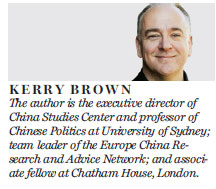HK has an appointment with destiny: Wise decisions are needed
Updated: 2015-06-17 07:44
By Kerry Brown(HK Edition)
|
|||||||||
This week the Legislative Council will have its appointment with destiny. It will have the opportunity to vote on whether the Hong Kong government's reform proposals on the 2017 Chief Executive election should be formally adopted. Most decisions made in a body like the LegCo, or any parliamentary chamber, tend to be short-term and limited in impact. There are votes for modifications of existing legislation, or introduction of new changes to tax rates and other fiscal issues. Most have an impact only in the terms of office of those in power when the changes are made. But now and then something momentous is put before chamber members. This is such an example.
If the chamber vote against the proposals put forward, then the current arrangements will continue. It is unlikely any new ideas will be brought forward for another five years at least, perhaps even longer. The simple fact is that the choice is between two options. Support what exists now or what has been proposed for 2017 in the Aug 31 decision of the National People's Congress Standing Committee (NPCSC). It is clear there is no third option that will magically appear out of nowhere.
In that context, those voting this week carry a big weight of responsibility. They truly do have to stand outside their current situation, and look beyond beliefs and convictions that they personally hold. This new arrangement they are being asked to pass is probably not something they would regard as ideal, and, in some cases, something they would have thought utterly antipathetic some years before. But in politics, pragmatism has to sometimes prevail. Going resolutely for optimum outcomes often leads to total defeat.
This great responsibility means the LegCo members have to think about this decision in a different way to many of the others that have come their way. However hard it is, they have to strip away the emotion and the surrounding buzz of noise and focus on one core question: What is in the best interests of Hong Kong? Will continuing with the current system serve it best, or the revised one under the Aug 31 decision? They can be pretty certain now that there are no other options that are readily on the table. So the choice is a very simple, but stark one. Change now, when it is certain. Or wait for some day later, the date and circumstances of which are entirely unknown, for something that might be better - or perhaps even worse. It might not even happen.
Helping them make this decision is the knowledge that Hong Kong is an environment that thrives on certainty. Its legal system, its prowess in finance and trade, its openness and other economic and social attributes, all create a context of predictability. At least this week, one of the major elements of unpredictability could be removed. Hong Kong and the world will know what system of governance will be in place in 2017 and afterwards. That too is important to factor into their considerations. Voting for the proposed changes means there is less uncertainty than voting against them.
Finally, there is the issue of what message legislative members will send if they decide to stick to what they say are their principles, to eschew the new deal, and to insist on continuation of oppositional politics. Opposition is a comfortable place to be some times. It has little responsibility and means those that inhabit it can permanently take the position of the critic. A world run on this model would be a place of constant dithering and argument. Sometimes, leaders in an assembly like the council have to lead, even if they will be clashing with public opinion. Their job is then to go out and argue for how the new situation can be adapted and changed, and create a new consensus. That is a fundamental part of democracy. It is what leaders like President Barack Obama in the US or Chancellor Angela Merkel in Germany do every day of their lives. Most of the time, if they are successful, they will find the middle ground and carry public opinion with them.
Hong Kong politics at the moment is dangerously divided. It consists of people who are either painted as supporters of the establishment, or those who regard themselves as opponents and dissenters. For Hong Kong to have a prosperous future as a polity as well as an economy (and the two are intimately linked) this sort of highly emotional, often deeply divisive public discourse has to change. Acceptance of compromise, thinking of longer-term goals, and trying to understand what best serves the interests of all Hong Kong people rather than different factions of the community in the city are critically important missions. Legislators need to focus on these bigger issues, see the proposals this week they need to pass judgment on as steps toward building a new, robust political community in Hong Kong, and vote to support that. They have a responsibility now and they should show it. Otherwise, why expect people outside the council chamber to listen to them if they are unable to show leadership among themselves?

(HK Edition 06/17/2015 page12)